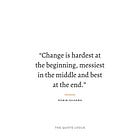You Don’t Need Motivation: You Need Meaning and Clarity.
How Defining Your Vision and Embracing Mortality Can Guide Your Actions.
You do not rise to the level of your goals. You fall to the level of your systems.
-James Clear
You don’t lack motivation, you lack clear vision, smart goals and well-designed systems.
None of us have life perfectly figured out. Uncertainty and anxiety are universal experiences. But our character is defined not by what we face, but by how we face it.
People fall into two groups:
Those who think deeply, dare to make mistakes, and execute their plans.
Those who avoid reflection and simply follow the motions.
The first group are generalists, people who follow their unique combination of curiosities, and build something that solves a problem or creates value.
They don’t care to fail, or to be left alone. They follow principles, do the right thing without permission and build without being asked.
The second group, however, is too lazy to get to know themselves. They don’t ask the hard questions like "Who am I?" or "What do I want to create?" They keep asking "How?" when they’re still struggling with the "Why."
Right questions can help you more than great answers.
But before you can add anything meaningful to the world, you must learn to live fully in it.
Life might feel ordinary—same problems, same routines. But its meaning comes from how we shape our experiences.
Embracing Mortality and Meaning to Shape Our Actions
You probably already know this: life is short, and your soul craves meaning-something that truly matters, something that channels your deepest desires into a craft or a solution for a painful problem. But the reality of mortality often gets lost in our daily grind and you wonder why you still waste time.
But, what’s the point of waiting? The truth is, time doesn’t wait for anyone. Your limited time on this Earth should drive you to act, to create, and to solve problems—not just for today, but for the legacy you leave behind.
This isn’t about obsessing over death. It’s about embracing the truth that we don’t live forever. So, when you think about your vision and the systems you need to build it, let the awareness of your mortality fuel you. Ask yourself: If I knew I had limited time left, what would I prioritize?
This urgency can give your efforts real power. It transforms your pursuit of goals into a mission—a quest for meaning and impact.
So rather than waiting for the perfect moment, you act now, create now, and build something that will resonate long after you're gone.
The Romans practiced memento mori: reminders of mortality to stay grounded. Similarly, the Prophet Muhammad said:
"Work for your worldly life as if you are living forever, and work for your Hereafter as if you are dying tomorrow."
This advice acknowledges two types of actions:
Finite actions: Focused on personal gain or immediate results. ( Dopamine or Pleasure)
Infinite actions: Rooted in the broader picture, creating ripples that extend beyond our lifetime. (Serotonin or Fulfillment)
(To get a better sense of the difference, you can read my previous post: Don’t focus on being happy)
For example, exercising for personal health is finite. But if you inspire others to adopt exercise as a habit, the impact becomes infinite. Like a butterfly effect, the positive change spreads far beyond your immediate reach.
The True Self: A Journey, Not a Destination
But here's the catch: When we talk about leaving a legacy or creating something meaningful, we often think of it as discovering a "true self" that is static and unchanging. We expect to find one clear, definitive purpose, something that will define us forever. But in reality, this “true self” is not a fixed, final destination.
Just like mortality reminds us that time is fleeting, it also teaches us that we are constantly evolving. Our true self isn’t something we find, but something we create through our actions, values, and decisions. Every moment, every choice, shapes who we are—and who we are becoming. Embracing this fluidity is key to truly living in alignment with our deepest desires.
If we wait for the "perfect version" of ourselves to emerge, we risk never acting at all.
Our purpose and our authentic self are found not by waiting for the "right" time, but by creating them every day through our actions, vision, and systems. Meaning isn’t something you find—it’s something you build, moment by moment, while embracing the fact that you’ll always be unfinished, always evolving, just like the world around you.
Perhaps there is no singular, fixed “self.” Maybe we are shifting collages of different personas, each as authentic as the next.Maybe you have no true colors. You’re not some finished painting, signed and sealed in varnish. If there is a ‘real you,’ surely it’s the mess of paint on the palette: colors swirling and mixing and playing together, perpetually unfinished, searching and striving to make something new.
—The Dictionary of Obscure Sorrows
Death as a Catalyst for Living Authentically
When you fully accept that time is limited, you stop clinging to the idea that you must 'figure out' your true self before you start living. Instead, you embrace the process of creation, the journey of becoming, which happens in every moment, in every decision, and in every action.
The Anti-Vision as the Path to Clarity
In order to build your authentic self and live meaningfully, you must first understand what you don’t want. Dan Koe has created this incredible concept of Anti-Vision, which acts as a tool to reflect on the life you fear, the one that would keep you stuck, unfulfilled, and disconnected from your true essence. What behaviors, habits, environments, and people contribute to a life that doesn’t align with your evolving self?
Purpose:
The Anti-Vision is a tool to define what you want to avoid in life. It is the negative space that shapes your desired reality.
Steps to Create Your Anti-Vision:
Observe Society:
Pay attention to people's habits, lifestyles, and choices.
Reflect on behaviors and outcomes you wish to avoid (e.g., unhealthy habits, financial instability).
Reflect on Past Experiences:
Identify the lowest points in your life.
Analyze the causes and patterns that led to those moments.
Commit to actions that prevent repeating these experiences.
Make a List:
Write down specific things you don’t want in your life.
Include habits, environments, relationships, and behaviors.
Visualize Consequences:
Imagine your life in 10 years if you continue your current habits.
Use this to fuel a desire for change and action.
Transmute Energy:
Channel the clarity gained from your Anti-Vision into creating a passionate, positive vision for the future.
The Vision as the Roadmap to Your Evolving True Self
From there, your Vision1 becomes a blueprint to guide your actions toward creating a life that honors your evolving self. Your Vision is not static—it’s a living, breathing process that shifts as you grow. It allows you to act in alignment with your true desires, giving you both short-term clarity and long-term purpose.
Purpose:
Your Vision is your guiding framework for long-term goals and daily actions. It reflects your dreams and aspirations.
Steps to Create Your Vision:
Opposite of the Anti-Vision:
Define the inverse of your Anti-Vision.
Be specific about the life you want to build, from career and relationships to personal growth.
Prime Your Mind:
A clear vision enhances pattern recognition, enabling you to spot opportunities that align with your goals.
Balance Short-Term and Long-Term Goals:
Create a roadmap that incorporates immediate steps and future aspirations.
Avoid focusing exclusively on one; maintain a dynamic perspective.
Break It Down:
Translate your vision into actionable milestones (e.g., yearly, monthly, and weekly goals).
Work consistently toward these milestones to ensure progress.
Execution Through Learning:
Constantly educate yourself and acquire skills aligned with your vision.
Solve real-world problems and build tangible projects that embody your aspirations.
Building Systems for Your Vision
Once you know what to avoid, flip it to define what you want. Build systems around your vision, breaking it into actionable, SMART goals:
Milestones: Goals you complete once, like buying a house.
Lifestyles: Habits you maintain indefinitely, like staying healthy.
Purpose-driven goals: Actions that serve a larger cause.
Systems help translate dreams into reality. As James Clear notes, they keep you on track regardless of motivation.
How to build systems for habits:2
Cue-Action-Reward Loop:
Design clear cues to trigger habits.
Ensure a simple, satisfying reward after the habit.
Start Small:
Begin with tiny, manageable actions (e.g., 1 push-up).
Focus on consistency over intensity.
Habit Stacking:
Anchor new habits to existing ones (e.g., "After brushing my teeth, I’ll meditate for 1 minute").
Environment Design:
Make good habits easy by removing barriers (e.g., place running shoes by the door).
Minimize friction for desired actions.
Tracking & Feedback:
Use visual trackers (like calendars or apps) to monitor progress.
Reflect and adjust based on results.
Automation & Preparation:
Automate repetitive tasks where possible.
Prepare tools in advance to eliminate excuses.
Commitment Devices:
Use accountability partners or contracts to stay on track.
Long-term Focus:
Build systems that grow with you (e.g., scaling up habits gradually).
These systems create a sustainable structure for forming and maintaining habits.
As you evolve, your Anti-Vision and Vision may shift—this is the process of creating your true self. The key is not to be afraid of change or imperfection but to embrace the process of becoming. You aren’t searching for a fixed 'true self'—you are creating it through your choices, your actions, and your willingness to evolve in the face of uncertainty. Your mortality reminds you to act now, but your evolving self invites you to keep growing and shaping a life full of meaning, purpose, and authenticity.
Some resources that can help you implement what you’ve learned in this post:
From different books and studies including Atomic Habits by James Clear; The Power of Habit (Charles Duhigg): Focus on cue, routine, and reward loops, Tiny Habits (BJ Fogg): Start with small, easily achievable habits.











Your articles are very good, I need to re read and take notes to make the most of it. Do you have something related to bad habits, distraction, laziness, adictions? It's important to get clean to get new good habits.
This -> They keep asking "How?" when they’re still struggling with the "Why.
So profound